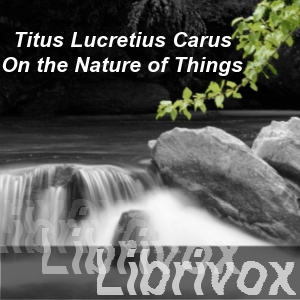- Poetry
-
- General Fiction
- general
- Family
- Physics & Mechanics
- Comedy
- Arts
- humor
- Music
- Exploration
- medieval
- contemporary
- Art
- ballads
- Erotica
- History
- Atheism & Agnosticism
- Essays
- Historical
- Design & Architecture
- Leisure
- Writing & Linguistics
- Health & Fitness
- True Crime
- Fiction
- Crafts & Hobbies
- Education
- Sports Fiction
- Letters
- Society & Culture
- Religious Fiction
- Elegies & Odes
- Family & Relationships
- Business & Economics
- Narratives
- Travel Fiction
- Lyric
- Sports & Recreation
- Transportation
- religion
- Science
On the Nature of Things (Watson translation)
by Titus Lucretius CARUS (c. 99 BCE - 55 BCE)12 - Book 4, pt 3 - Motion in animals and motion in images. Sleep and causes of dreams. Love and desire and their influence.

Written in the first century b.C., On the Nature of Things (in Latin, De Rerum Natura) is a poem in six books that aims at explaining the Epicurean philosophy to the Roman audience. Among digressions about the importance of philosophy in men's life and praises of Epicurus, Lucretius created a solid treatise on the atomic theory, the falseness of religion and many kinds of natural phenomena. With no harm to his philosophical scope, the author composed a didactic poem of epic flavor, of which the imagery and style are highly praised. (Summary by Leni)
Listen next episodes of On the Nature of Things (Watson translation):
13 - Book 5, pt 1 - Praise of Epicurus. The world is not eternal. Heavenly bodies. The world had a beginning and will have an end. , 14 - Book 5, pt 2 - Cosmogony according to Epicurus. Causes of the motions of heaven. The magnitude of heavenly bodies and causes of their phenomena: day and night, phases and eclipses of the moon and the sun. The production of plants, animals and man. The existence of monsters. , 15 - Book 5, pt 3 - The rudeness of the early life of men. The invention of speech.The discovery of fire, the progress of society. The rise of religion from ignorance of natural causes. The discovery of metals and the progress of the arts. , 16 - Book 6, pt 1 - Panegyric on Athens. Meteoric appearances in the heaven. Causes of shooting stars, lightning, thunderbolts. Ridicule of those who attribute the origin of the storms to gods. , 17 - Book 6, pt. 2 - Origin of water-spouts, clouds, rain, rainbow, earthquakes and other phenomena. About the seas and volcanoes. About rivers and lakes. , 18 - Book 6, pt. 3 - About the temperature of waters. About magnets and why metals are attracted to them. About the origin and cause of diseases. Description of the plague that depopulated Athens during the Peloponnesian war.